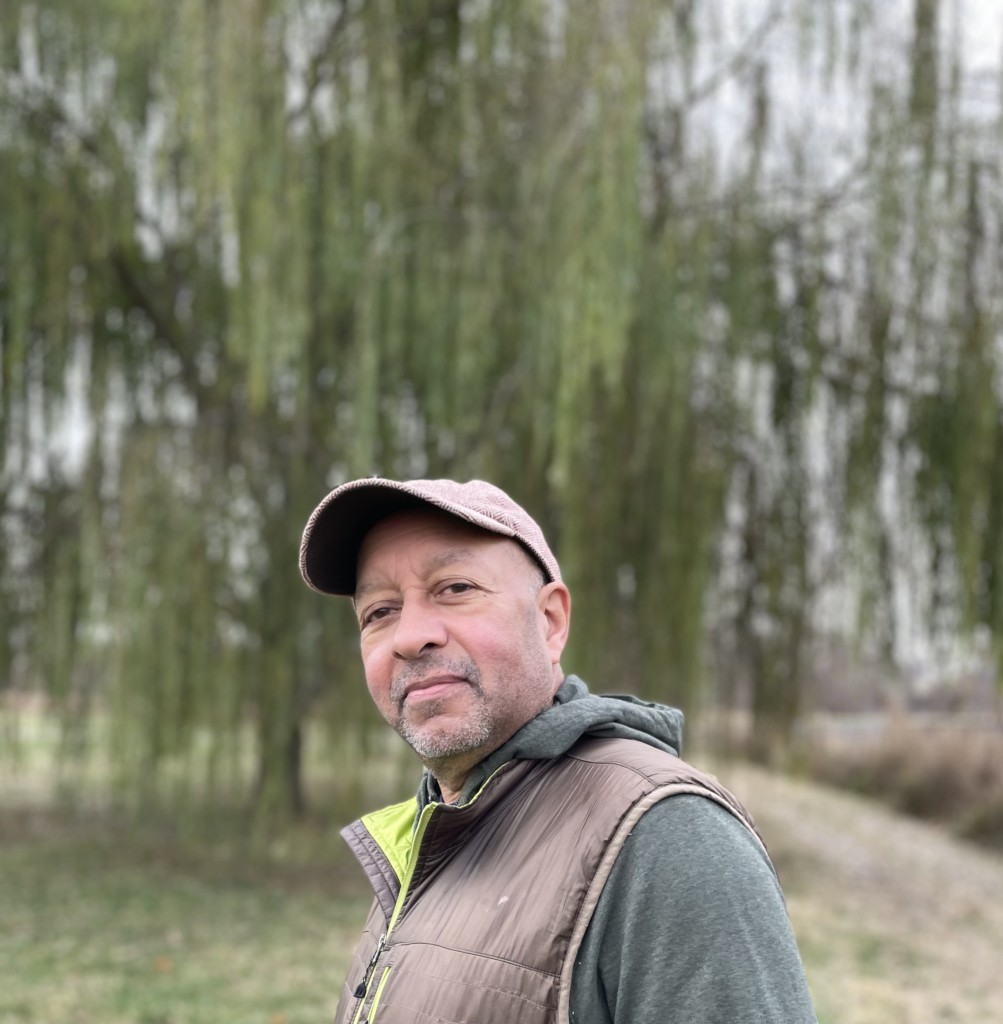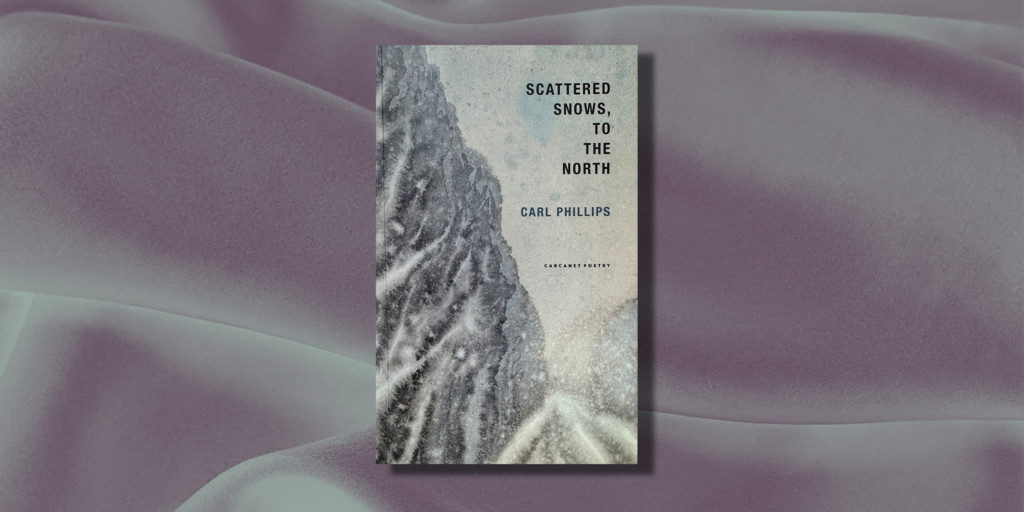Welcome to our Writers’ Notes for the 2024 T.S. Eliot Prize shortlist. These are educational resources for poets looking to develop their practice and learn from some of contemporary poetry’s most exciting and accomplished voices. Here’s Carl Phillips on his collection Scattered Snows, to the North.
Collecting Fragments, Getting Lost…
How do I write, what is my practice, and how did it inform my book Scattered Snows, to the North – large questions! I write whenever the mood strikes, which is usually about once a month, but it’s never something I can predict. If I have a practice at all, it’s a combination of observing and collecting. I spend a lot of time outdoors with my dog; I also spend a lot of time cooking each day. It’s usually during these times – cooking, walking the dog – that random thoughts will occur to me, a fragment of a sentence, a particular word, something I’ve seen out the window or along the walk. I collect all of these things in a notebook, then I forget about it. Then, if I’m lucky, I’ll have an evening when I feel that, if I were to look at the notebook, I might be able to build a poem from the pieces I’ve collected. It’s almost as if I have to trick myself into forgetting I’m writing a poem – if I think about it too much, the moment fades. So I pretend I’m just pushing things around, seeing how they look together, seeing where one sentence leads me. And trusting the next step past that.
So I suppose I could say that my actual process, when writing, is one of getting lost. I can’t write if I have a particular subject in mind. Instead, I have to find my way toward the idea, toward meaning. A poem’s particular meaning isn’t always clear to me, once I’ve finished the poem – this is why it can take weeks for me to find the right title…
To Be Living, in Language
Other than this, I don’t really have a particular method. Nor do I have a technique for what some people call writer’s block. If a piece isn’t working, I put it away. If I can’t seem to write, I assume that means I’m not ready to write, so I don’t try. I think readiness is the main point here. Many poets have a writing routine, a daily practice, and they even write poems every day. I’ve never been like that. Instead, I try to remain in readiness for when the writing moment might occur, or at least when an idea or image might occur, which can be collected for when the actual writing moment happens. What’s most important is to be living in language, whether I’m writing or not. With that in mind, I make a point of reading every night for about four hours – usually I read fiction, but poetry as well. Even if I’m not conscious of it, I find that when I’m reading I’m studying sentence making, I’m learning how another sensibility than mine has chosen to deploy language. All of this adds to what I already know about language and sentence making. I count this as writing time, because I’m acquiring/being exposed to new writing strategies, adding to my own arsenal, as it were. I think this is why so many writers advise beginning writers to read as widely and deeply as possible – it seems too easy an answer, but it makes complete sense that the way to ‘master’ a field is to see how others have done so before me. Not that I believe in mastery…
The Edit.
As for the editorial process – I’m guessing you mean how I edit my own work, how I revise it. For the most part, revision happens quickly, necessarily. I’m not good at returning to a draft the next day and working on it; it’s more as if everything has to happen in one fell swoop. A typical writing evening would begin, as I mentioned, with looking at what I’ve collected in my notebook. Once I’ve gotten a decent handwritten draft, I usually do a handful (five?) more handwritten drafts – the original one often looks like a block of prose. Once I start writing the other drafts, I say my sentences out loud, to figure out where I hear a pause, which is where I might break a line, and where I feel there’s too much sonic regularity, which is when I might rough up the sound, to make it seem less poem-like and more like speech. Once I feel okay with the line breaks, I’ll type out a draft on the computer. I hold off, on the computer, until I’m pretty certain about what I’ve written, because I don’t trust myself with the computer – the computer makes things look like poems too easily, and it also encourages tidying up, rather than leaving overly long or short lines to be what they must be. (I don’t think this is so for everyone, I suspect it’s generational – I didn’t grow up with computers, so pen and paper are where I feel most in control of the writing.) There are usually many typed drafts – ten or so – before I’m satisfied with how the poem looks on the page, including stanzas, if there are stanzas.
Strangely, Strangely…
That leaves the title to be sorted out. I’ve mentioned that that can take weeks to find. I think it’s because I write about large metaphysical things like love, death, desire, freedom, trust, etc. So it’s not as easy as titling a poem about walking my dog or about working in the garden. But the other thing is that I like a title that resonates strangely, uneasily, with the poem beneath it. It’s as if the title is one poem and the poem beneath is another; how do they choir together, once they’ve been put in the same context? What associations come to mind, for the reader? It’s a bit like the paintings of Mark Rothko, which are often two blocks of color, one above the other – the titles are usually too abstract to give a clear meaning to the painting. So the viewer is left to consider how a block of blue, for example, resonates with the block of orange beneath it – what comes to mind, what gets felt in the body? I love this kind of work, as a reader and a viewer, rather than a prescriptive title. Or if I do have a clear, obvious title, I want the poem that follows to seem at first to have nothing to do with that title. If I call a poem ‘Dog Walk,’ the last thing you’ll find in the poem is a dog or a walk…
Which is, I suppose, a way of saying that I am most interested in surprise in poetry. I want to surprise myself with what I discover, and with how I discover it. I want that as a reader, too. I want to be surprised into understanding the world I thought I knew in an entirely different way.
The Poetry School and T.S. Eliot Foundation have long collaborated on celebrating the T.S. Eliot Prize shortlist, highlighting this major fixture in the poetry calendar as a fantastic way into the art form and an opportunity to learn from poets at the top of their craft. This year we have a series of Writers’ Notes from the shortlisted poets, alongside a special one-off course with the fabulous Rachel Long, specifically focused on reading and writing after the shortlisted book, Adam by Gboyega Odubanjo. Additionally, we also have an exciting generative workshop exploring the whole shortlist as inspiration for new writing with T.S. Eliot Prize-winner, Joelle Taylor!

Carl Phillips’s latest book of poems is Scattered Snows, to the North (Farrar, Straus & Giroux, 2024). His Then the War: And Selected Poems 2007-2020 (Farrar, Straus & Giroux, 2022) won the 2023 Pulitzer Prize. Other honors include the Jackson Poetry Prize, the Kingsley Tufts Poetry Award, the Los Angeles Times Book Award, the Aiken Taylor Award for Modern American Poetry, and awards and fellowships from the Guggenheim Foundation, the Academy of American Poets, the American Academy of Arts and Letters, and the Library of Congress. Phillips has also written three prose books, most recently My Trade Is Mystery: Seven Meditations from a Life in Writing (Yale University Press, 2022). He lives on Cape Cod, in Massachusetts.

Add your Reply
You must be logged in to post a comment.